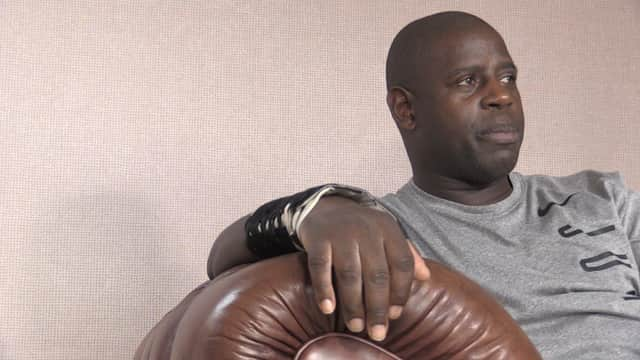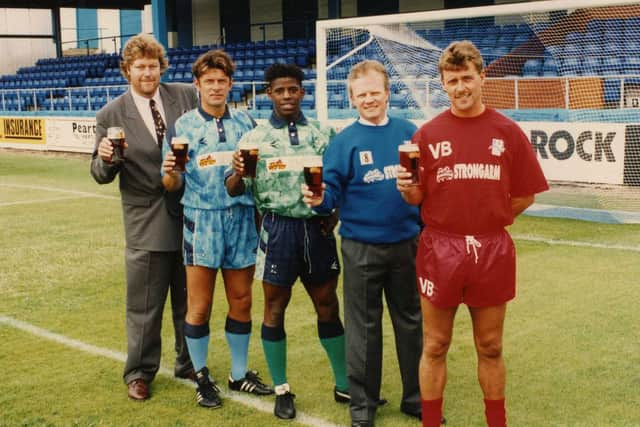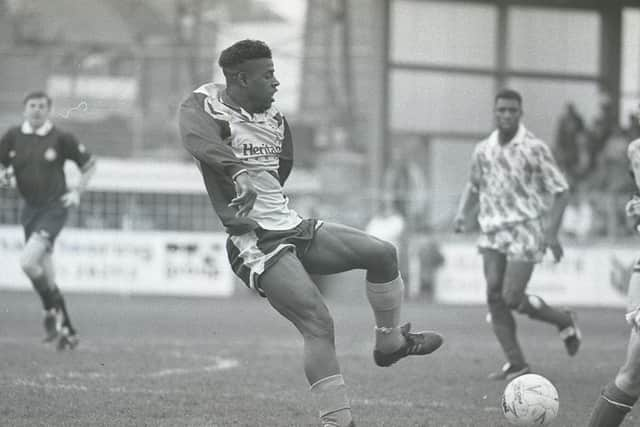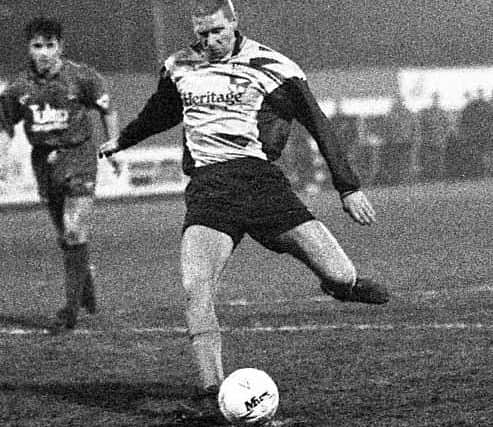Former Hartlepool United star's autobiography discusses career, racism and his fight for life


"I know what is around the corner and I accept all that. There is nothing I can do,” he says.
"But I have had a really good life. It is not all doom and gloom and I enjoy my time with my family and friends.
Advertisement
Hide AdAdvertisement
Hide Ad"I think there are other people who have it far more difficult than me.”


One of the first black players to play for Hartlepool United – much more of which later – Lenny became a primary school teacher in his native Lancashire after a playing career largely spent with Bury and Burnley.
Now 50, he was diagnosed with incurable motor neurone disease, which prevents messages from the brain and nerves from reaching muscles, in 2017 after a niggling hand injury from performing somersaults at school failed to clear up and affected his ability to grip.
The illness later spread to his legs and he has spent most of the last year in a wheelchair while receiving support from his family and a full-time carer.
Advertisement
Hide AdAdvertisement
Hide AdHe is still active, however, championing the work of the Motor Neurone Disease Association (MNDA) and completing his autobiography.


"I think 50 per cent of people die within two years of diagnosis and 95 per cent die within five years,” he says.
"I was diagnosed three-and-a-half years ago and the prognosis is not great.
"But I have done alright. I am one of the lucky ones and my mind is fine. I have known people who have died within months or weeks of finding out.”
Advertisement
Hide AdAdvertisement
Hide AdFinding A Way – “it is about coping mechanisms for whatever issues there are in your life” – will discuss his illness, associated mental health problems, racism and his football career.


Born in Preston, Lenny arrived at Hartlepool United in early 1992 from Blackburn Rovers after owner Jack Walker and manager Kenny Dalglish began a football revolution which would climax with the Lancashire club winning the Premier League just three years later.
He recalls: “David Speedie had already joined, I got injured and by the time I was back they had brought in players like Tim Sherwood and Mike Newell.
"I knew Kenny didn’t fancy me as a player, which happens in football, so I had to move.”
Advertisement
Hide AdAdvertisement
Hide AdHartlepool United were undergoing their own revolution under colourful Wheatley Hill property developer Garry Gibson when Lenny signed for a reputed £50,000.
Fresh from only the club’s second promotion in their 84-year history, his late winner against Bournemouth on the final day cemented a surprise top-half finish in what was then Division Three.
Summer signings such as Dean Emmerson, from top-flight Coventry City, then raised hopes that Pools could even reach the game’s second tier for the first time.
By January 1993 those dreams appeared genuine after Lenny took part in one of the greatest days – some would argue “the” greatest day – in the club’s existence.
Advertisement
Hide AdAdvertisement
Hide AdHandily placed for promotion, Alan Murray’s team defeated Premier League Crystal Palace 1-0 in a third-round FA Cup tie on an arctic Victoria Ground pitch.
Lenny remembers: “What a day, what an atmosphere. The fans were great and Palace just didn’t fancy it.
"I remember Nigel Martyn, the England goalkeeper, came out with tracksuit bottoms on and we knew they were not up for it so totally weighed into them.”
Within days, however, that existence itself was in jeopardy as financial problems surfaced which would plague the remainder of Gibson’s reign as chairman until he sold up in 1994.
Advertisement
Hide AdAdvertisement
Hide AdLenny, who scored 16 goals in 82 games for Pools, says: “We did not win a game after that for two or three months and there was a time when we did not even know if we were going to get paid.
"I do not really know how it happened. Perhaps Garry Gibson took a gamble and it just did not work.
“There was a time as players where we could not carry on. But we were told if you do not play, there’s no game, no revenue and no chance of getting paid.
"So there was a period where we were getting paid off the turnstile money and walking out of the ground with bags of coins.”
Advertisement
Hide AdAdvertisement
Hide AdPools, with Viv Busby replacing Murray during the continued slump, eventually survived both on and off the pitch with Lenny’s April winner at promotion-chasing Stoke City instrumental in avoiding relegation.
By the end of the 1993, however, those continued financial pressures triggered his departure to Bury with Hartlepool’s demotion following months later.
Save for a short period at Swansea City – where he scored the goal which preserved their Football League status – he remained in Lancashire across five spells with both the Shakers and Burnley before retiring in 2004.
Looking back on his time at Hartlepool, where he mainly played as a forward, he recalls: “I really enjoyed Hartlepool. I loved the club, the people, the fans, they were great.
Advertisement
Hide AdAdvertisement
Hide Ad"The problem was we were living in Billingham and it was not really friendly at all. You’d get called the usual names in the street and the shops because I was one of the few black people in the area.
"I could cope. I had experienced racism from an early age and could train and play to take it off my mind. But it was different for my wife at the time.”
Racism – such as the abuse he received from the Newcastle United terraces while warming up as a young Blackburn substitute – will also feature in his autobiography.
Does he think the problem is worse today than during his career? “People are far more tolerant than they were in the 1980s but there is still a long way to go.
Advertisement
Hide AdAdvertisement
Hide Ad"There is always something somewhere that people do not like. Gender, sexuality, colour, whatever. Okay, if that’s the way you are, I get that.
“But people have to learn to keep it to themselves and having social media at your fingertips does not help.”
Lenny himself is using technology positively and has launched a fundraising drive in aid of MNDA in which he aims to visit all 92 clubs, either in person or by video link, to urge players and staff to support the association’s research into potential cures.
Further details are available by searching for Project 92 on www.justgiving.com.
Advertisement
Hide AdAdvertisement
Hide AdProceeds from Finding A Way, which is due to be released in September, will also support MNDA.
MNDA can be contacted on 0808 802 6262 with further details about its work available at www.mndassociation.org.